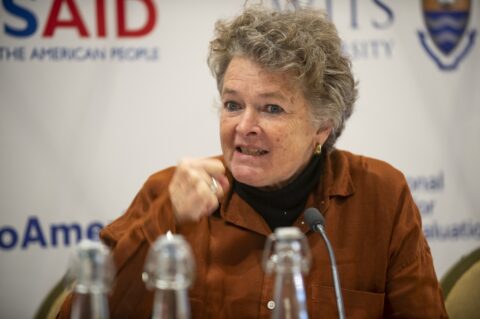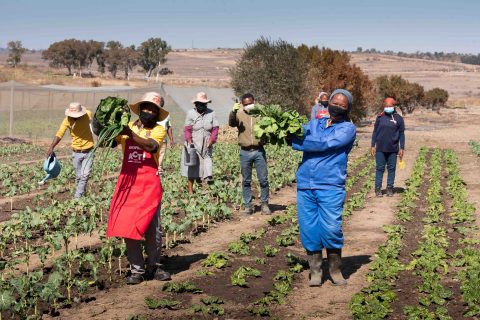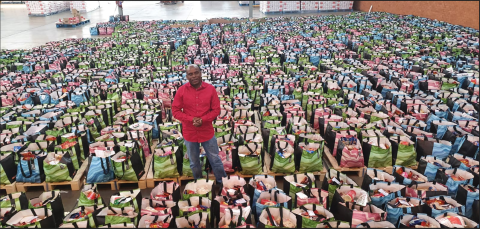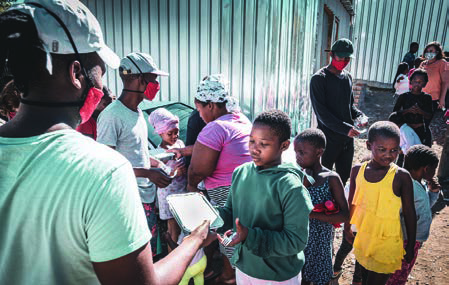Voice of the Local Government
Homelessness Within A Policy Vacuum
There’s no reliable data to quantify the extent of homelessness in South Africa. Before the pandemic, it was thought that about 200 000 people were living on the street. However, Raymond Perrier, director of the Denis Hurley Centre in Durban, says the number of meals for the homeless has doubled. And this is just in eThekwini. “The economic impact of COVID-19, the riots and the recent flood has probably led to more homelessness.”
The National Homeless Network, a movement of more than a dozen organisations in eight cities, says StatsSA’s recent census in February this year was “completely flawed”, and a lack of planning means that the recent count will be “useless in accurately gauging the number of homeless”. As Stephan de Beer, executive director for the Centre for Contextual Ministry in the Department of Practical Theology at the University of Pretoria, explains, “part of the problem is exactly this: the lack of accurate data to inform policy, strategy and budgets”.
De Beer estimates that there are closer to 70 000 to 100 000 in the larger metropolitan areas, and smaller populations of a few 100 each in cities like Stellenbosch, George and Mbombela. Mary Gillett-de Klerk, founder of the Johannesburg Organisation of Services to the Homeless (JOSH) and head of the Johannesburg Homelessness Network, reckons there are 15 000 plus homeless people in Johannesburg alone.
The numbers also depend on the definition of homeless. Broadly, it could include everyone who does not have secure tenure in informal housing. But the narrow definition would be those with no shelter at all or those living in temporary shelters, explains de Beer.
“We need to establish more accurate numbers,” says de Beer. While there’s no certainty that homelessness has increased since the pandemic, the precariousness of those who are “near” homeless, has certainly intensified, he says. There are more people living in cheap flats or informal settlements who, should they be evicted, could be homeless. Also, from de Beer’s observations in Tshwane, it seems as if there are more women homeless than before.
Homelessness is not a choice
De Beer says the lack of housing options available to homeless people is a concern. While older people on SASSA grants and those with mental illness need permanent housing, there are young, unemployed homeless people or women with children who require temporary safe spaces. They also need an income to break the cycles of homelessness, he says. “Incentives should be created for nongovernmental organisations (NGOs) and homeless co-operatives with business ideas to create their own small enterprises for economic self-reliance.”
Other hurdles include a lack of access to documentation such as IDs, or the funds needed to get them home if they have come to an area seeking work. Furthermore, homeless people need access to primary healthcare, says de Beer. He suggests that municipalities or provinces could support the funding of street medicine programmes.
One of the greatest threats to those living on the street is often the municipalities tasked with providing solutions. Municipal bylaws empower the metro police to confiscate homeless people’s belongings – including IDs – rendering them even more vulnerable, says de Beer.
“A big part of the problem is that homelessness is seen as pathological and criminalised and not as a systemic failure that needs to be addressed comprehensively.”
Exposing the faultline
De Beer says the pandemic created new visibilities about the plight of the homeless in South Africa and globally. “In Tshwane, we did more in 10 days of hard lockdown to house 2 000 people in temporary spaces than we had achieved in 10 years.” Many of these facilities are still open, providing opportunities that previously did not exist. But the past two years have also highlighted the faultlines, exposing the vacuum that has been created by the lack of a national policy to deal with homelessness. It made it apparent that it is often left to municipalities to deal with the many issues affecting those living on their streets, says de Beer.
President Cyril Ramaphosa placed the onus on local government when he said, at the start of lockdown in March 2020, that there should be temporary shelters in every municipality. “Local municipalities and provinces were very much left to their own devices, showing up all the faultlines,” notes de Beer.
“The lack of a national policy with clear guidelines not only creates confusion at provincial and local government levels, but also gets used as an excuse for inaction as the ball is passed between departments and different spheres of government,” says de Beer. Perrier refers to this as a “chicken and egg” scenario where the lack of a co-ordinated response by government is why there is no policy in place, and the lack of a policy is the reason for government’s poor response.
Without a national policy, there’s also no funding from the treasury for local governments to deal with homelessness. This means that much of the work done at local level is based on an unfunded mandate. Only the Western Cape and Gauteng provincial budgets have allocations for the homeless, says de Beer.
“Homelessness is not just a social development issue or an issue of personal choice or pathology. It is a systemic failure to deal well with various issues that lead to homelessness,” says de Beer. A solution would involve input from all spheres of government, across the departments of human settlement, health, economic development, public works, and social development.
Nozibele Makanda, SALGA’s portfolio head of health, community services and inclusivity, agrees on the importance of a co-ordinated response. “SALGA is of the view that addressing homelessness is a welfare service. In terms of Schedule 4, part A of the Constitution, welfare services are a concurrent function of provincial and national government. However, in the discharge of these functions, the provincial and national government must co-operate with municipalities,” she says.
No capacity
Despite being expected to tackle homelessness, only a few cities – Cape Town, Tshwane (albeit with no budget) and Stellenbosch – have policies to do so, says de Beer. With no clear direction and a lack of interdepartmental co-operation, dealing with the homeless is usually left up to social development. “There is not always political will, or a political or administrative champion of the cause is redeployed or outvoted so there is a lack of continuity,” adds de Beer. While Cape Town and eThekwini are doing some things right, he says, municipalities, NGOs, and the research community need to learn more collaboratively. Tshwane, for example, now has a Community of Practice that brings together practitioners dealing with homelessness to collaborate and assess their approaches.
Gillett-de Klerk says municipalities should focus on their core mandates of delivering basic services and infrastructure, rather than trying to replicate the work of NGOs. Instead of managing shelters, municipalities could lease state-owned buildings to organisations with the expertise to work with homeless people. “Cities should preferably not run shelters, they should rather contract reputable organisations to do so,” emphasises de Beer.
The way forward
We need collaboration, says Gillett-de Klerk. “The system is broken and needs fixing. If we don’t have a national policy, are we even speaking the same language?”
The faultlines exposed by the pandemic have placed homelessness firmly on the policy agenda, and the national Department of Social Development is developing a national integrated policy framework on homelessness, says Makanda.
“SALGA has consulted with the department to ensure that the roles and responsibilities of the various sectors are clear and within their prescribed functions and powers.”
Key discussions at a recent SALGA consultation session included the experiences and reflections on the roles played by civil society organisations in the management of shelters and the homeless before and during the pandemic, as well as currently. The relationship between all three spheres of government, communities, the private sector, and other stakeholders, was also highlighted, says Makanda. However, it seems the process is moving slowly. “The Department of Social Development is the custodian of that policy. We have not heard much from them in the past six months,” concludes Makanda.






 Sign-up and receive the Business Media MAGS newsletter OR SA Mining newsletter straight to your inbox.
Sign-up and receive the Business Media MAGS newsletter OR SA Mining newsletter straight to your inbox.